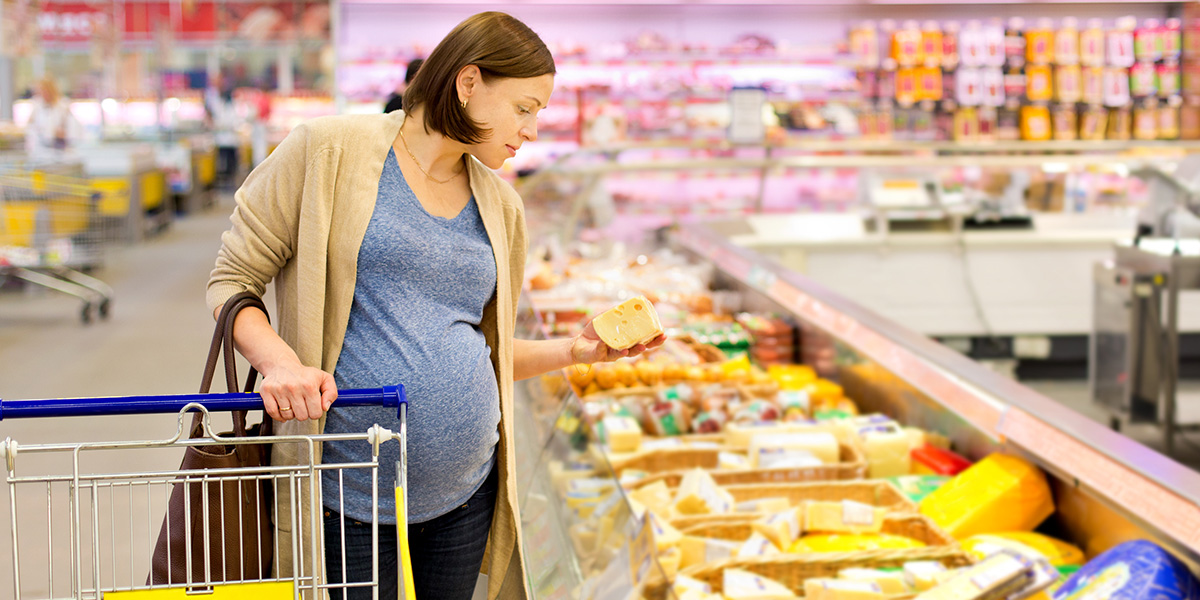
You probably know there are a lot of guidelines about what you can and can’t eat during pregnancy. But did you know a lot of the rules have to do with a bacteria called listeria? Here are seven things to know about listeria and why it’s so important to make safe food choices during your pregnancy.
- Pregnant People Are at Higher Risk of Infection: Listeria is the third leading cause of death from food poisoning in the United States, with about 1,600 people getting sick each year. Pregnant women have an increased risk of developing an infection due to listeria, known as listeriosis. Expecting mamas are 10 times more likely than non-pregnant people to develop listeriosis. The risk is even higher in pregnant Hispanic women.
- Listeriosis Can Affect Babies In-Utero: Even with mild symptoms, pregnant women can unknowingly pass listeriosis to their babies. Listeriosis can be incredibly dangerous for unborn babies and newborns, and can potentially cause serious issues such as infections of the blood or brain, disabilities, and even preterm labor.
- Check Your Labels for Pasteurization: Pasteurization is a process that heats packaged foods to a safe temperature in order to destroy microorganisms. Be sure that any dairy products, especially milk and soft cheeses, have the words “pasteurized” or “made with pasteurized milk” on the label. The same rule goes for juices. Avoid “freshly squeezed” bottled juices that have not been pasteurized. Choosing pasteurized products can be tricky at places like farmers’ markets, so take care when shopping and eating. If you have questions or are unsure if something has been pasteurized, ask the vendor for details.
- Uncooked Foods Are Culprits: Listeria can contaminate foods that aren’t usually cooked, such as deli meats and raw sushi. However, even foods we may not suspect can carry listeria, including pre-cut fruit and vegetables and raw sprouts.
To minimize your risk, cook all meats to 165 degrees Fahrenheit (or until steaming for deli meats) just before serving. Cooked seafood should reach 145 degrees Fahrenheit to ensure its safety. Wash all raw produce before cutting or eating, and be sure to keep cut fruits and vegetables (particularly melons such as cantaloupe) in the refrigerator. As for sprouts? Avoid them. Even rinsed or lightly cooked sprouts can contain bacteria.
- Shelf-Stable Ready-To-Eat Fish Is Safer: If you’re a smoked seafood fan, take special care where you purchase it. Canned or shelf-stable fish such as tuna, salmon, trout, and whitefish (whether smoked or not) is much safer than the refrigerated packaged fish found near the seafood or deli counters. Refrigerated cold-smoked fish (such as lox or smoked salmon) have not been heat treated in order to kill bacteria, whereas those on the shelf have been. You should avoid refrigerated smoked fish unless it’s in a cooked dish, such as a casserole, that reaches 165 degrees Fahrenheit.
- Listeriosis Symptoms Don’t Always Show Up Right Away: If you unknowingly eat something contaminated with listeria, symptoms of an infection can show up as early as one week, and as late as two months afterwards. Listeriosis symptoms are similar to the flu, and include fever, chills, muscle aches and an upset stomach. Some people also experience a stiff neck, headache, confusion, or loss of balance.
Newborns suffering from a listeria infection can show symptoms including little to no appetite, fever, irritability, vomiting, and difficulty breathing. If any of the following occur, seek medical attention immediately.
- Your Provider Can Test You for Listeriosis: If you have symptoms of a listeria infection or think you have eaten a contaminated food, contact your provider right away. Listeriosis is detectable with a blood test, and treatable with antibiotics. Early treatment can help prevent infection or complications for your baby.
We know that understanding the dangers of listeria can be a lot to take in, mama. But following these guidelines during your pregnancy can help protect you and your little one from a rare but serious infection. As always, if you have questions about the safety about any foods in your diet, chat with your provider.